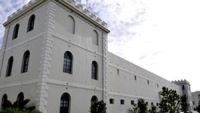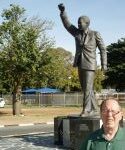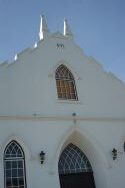
 If you’ve ever felt that going to school was like being in prison, you ought to consider going to the Graduate School of Business at the University of Cape Town, as we did. It’s right next door, a few miles from the main campus, which has been in the news for the protests that took down the statue of its founder—Cecil Rhodes, English colonialist par excellence (Rhodesia, now Zimbabwe, was named for him). Point is, the GSB is in a former prison (they have a marketing class called “Cells 101” I’ll bet!), which houses the school, and a hotel. The classroom we were in had a chalkboard (I wondered what I’d be able to do with the chalk I’ve pilfered over the years) and was named for “Old Mutual,” one of the leading local insurance companies, which we discovered, has funded rooms on other campuses in the Western Cape, the province that includes Cape Town.
If you’ve ever felt that going to school was like being in prison, you ought to consider going to the Graduate School of Business at the University of Cape Town, as we did. It’s right next door, a few miles from the main campus, which has been in the news for the protests that took down the statue of its founder—Cecil Rhodes, English colonialist par excellence (Rhodesia, now Zimbabwe, was named for him). Point is, the GSB is in a former prison (they have a marketing class called “Cells 101” I’ll bet!), which houses the school, and a hotel. The classroom we were in had a chalkboard (I wondered what I’d be able to do with the chalk I’ve pilfered over the years) and was named for “Old Mutual,” one of the leading local insurance companies, which we discovered, has funded rooms on other campuses in the Western Cape, the province that includes Cape Town.
We’ve spent the past two days with an interesting combination of business and academic visits, along with limited touring. Here’s some of the things I’ve learnt (this is a former British Colony, after all), starting with the Continent.
Africa is a continent, not a country. In fact, there are currently 54 countries in Africa, and one of my devious teaching tactics is to give students a map of Africa with the country outlines and a list of the names of the countries to match. More than ten is unusual. The divisions are more pronounced than the similarities. Based simply on the colonial past, the language groups are not a help; West Africa is predominantly French speaking, South and East is English, north is Arabic, with smatterings around the continent of Portuguese and Spanish, and Ethiopian, which is none of the above. Religious differences abound, even within some countries; Northern Nigeria (the biggest economy and with 170 million people, the largest country) has Muslims in the north and Christians in the South, similar to the Sudan. The current countries make as little sense as do some of the boundaries in Europe, with tribal underlays (11 official languages in South Africa alone).
It does not seem, either, from our speakers, that there is a sense of “Africanness” on the continent, unlike, say, China (I’ll have more to say about Chinese-African relations, which has so far been the focus of two of our speakers), where despite regional differences and dialects so different that they’d be languages in Europe, there is a sense of being Chinese. It’s hampered cooperation, which is probably economically essential. One of the books I read pointed out that one reason for the lack of business interest in Africa—despite the fact that in many ways it is easier to do business here than in Asia—is that the payoff with 1 billion Asian customers is higher than the individual 54 countries.
As for South Africa, we’re getting a feel especially for the Cape Town area, the Western Cape. Like many countries, it’s a product of its history, beginning with the Dutch, whose racial attitudes have stamped the country to this day. It’s ironic to me that in the 1960s, when the civil rights movement in the United States began to break down our version of apartheid, South Africa clamped down on its Blacks in ways that made South Africa a pariah. Not until the early 1990s did democracy come to South Africa, a movement that created what was then called a “rainbow nation” with four races—Black, Coloured, Asian, and White—partly a product of the British background, which brought in laborers (slavery was abolished in the empire in the 1830s, I believe) from other countries to work in the colony. As in Malaysia, where similar mixing happened, the Mandela government tried to redress the economic imbalance in particular (and the upper class is increasingly mixed), a thrust that has kept it in power despite the obvious problems the current regime has (President Zuma has 4 wives, 20 children, and spent several million dollars the country can ill afford to spend on his house). The party of liberation is kept in power partly because of its history—and close ties with the labor unions that give it about 70% of the vote and power in 8 of 9 provinces. It’s rival, we’re told, is in opposition, but without power of its own. The strength of labor has hamstrung some economic moves, as it has in Europe, and as I mentioned, one consequence was the move of some businesses to lower cost countries in Africa.
history, beginning with the Dutch, whose racial attitudes have stamped the country to this day. It’s ironic to me that in the 1960s, when the civil rights movement in the United States began to break down our version of apartheid, South Africa clamped down on its Blacks in ways that made South Africa a pariah. Not until the early 1990s did democracy come to South Africa, a movement that created what was then called a “rainbow nation” with four races—Black, Coloured, Asian, and White—partly a product of the British background, which brought in laborers (slavery was abolished in the empire in the 1830s, I believe) from other countries to work in the colony. As in Malaysia, where similar mixing happened, the Mandela government tried to redress the economic imbalance in particular (and the upper class is increasingly mixed), a thrust that has kept it in power despite the obvious problems the current regime has (President Zuma has 4 wives, 20 children, and spent several million dollars the country can ill afford to spend on his house). The party of liberation is kept in power partly because of its history—and close ties with the labor unions that give it about 70% of the vote and power in 8 of 9 provinces. It’s rival, we’re told, is in opposition, but without power of its own. The strength of labor has hamstrung some economic moves, as it has in Europe, and as I mentioned, one consequence was the move of some businesses to lower cost countries in Africa.
The country is big, partly (again) a function of its history. Cape Town centered on its ability to reprovision ships sailing around the Cape (we went back again to Stellenbosch, the second city founded in the Cape, and I’d love to wander around the Cape Dutch architecture; the  basis is agriculture and vineyards). Discoveries of gold and diamonds prompted the settlement of Johannesburg, which is still the financial capital of the country and home to over 50% of the some 48000 millionaires in South Africa. It’s 1000 miles away. As a result of the Boer War (the Dutch uprising to avoid British rule, as I mentioned, a brutal guerilla war that lasted about four years), the government even today splits time: the Parliament meets six months here and six months in Joburg, with administrative and judicial offices also in Bloemfontein.
basis is agriculture and vineyards). Discoveries of gold and diamonds prompted the settlement of Johannesburg, which is still the financial capital of the country and home to over 50% of the some 48000 millionaires in South Africa. It’s 1000 miles away. As a result of the Boer War (the Dutch uprising to avoid British rule, as I mentioned, a brutal guerilla war that lasted about four years), the government even today splits time: the Parliament meets six months here and six months in Joburg, with administrative and judicial offices also in Bloemfontein.
We’re in the Waterfront area, a huge mall restaurant complex that could be in any big city near the ocean. I’ll have more to add I suspect after our visits today—including to the US consulate—and I do want to comment later on the hot topic—China-Africa relations—based in part on our visit to the first Center for Chinese studies (with a focus on Africa).